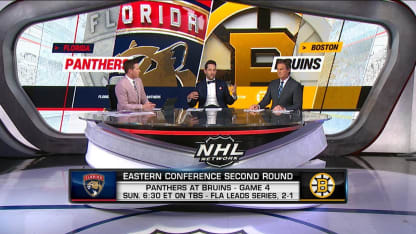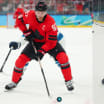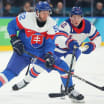Back then, Lohrei was still a forward, a position he would play until he was 16 and there were multiple injured defensemen on his team at Culver Military Academy in Culver, Indiana, where had chosen to go as a 15-year-old.
It would be a monumental decision.
It has yielded a player who brings all of his offensive instincts to a defensive position, a player who his college coach Steve Rohlik said is “just scratching the surface of playing the position.” With that, there is still some maturation to come, still some understanding of when to try the crazy play and when not to, when to go for it and when to hold back.
“Now, he knows the position, he’s learning when to, when not to, the high risk to the simple play,” said Rohlik, the coach at Ohio State. “The simple play is not a bad thing. I talked to him a lot, like being boring sometimes is not a bad thing. And he’s capable of that, but he’s capable of obviously doing a lot more.”
And he doesn’t shy away. He’s willing to take chances, ones that could make a coach nervous, but that often work out.
“There’s been a lot of those moments, like jumping into a rush, it might be late in the period. And you’re like, ‘No, we don’t need that, OK, nice play, whew, nice goal,’” Rohlik said. “He’s good enough to pull a lot of that off, but I think he’s also smart enough to understand, ‘I’ve got to pick my spots a little bit better.’ He’s gotten to this level, it can’t be just run-and-gun whenever you want to go, but you never want to take that away from a horse that can get out there and sprint.”
Part of that comes from the lens through which he sees the game, partly born of being a coach’s son, partly just an innate ability to have a certain feel for the ice, to see what is coming and join plays and make plays. There are things he will try, Rohlik said, that others wouldn’t even think about.
But if there is one thing that is clear, it’s that Lohrei is not cowed by the big moments, not intimidated by the players he now shares the ice with, not interested in holding back. He is not afraid.
“I just think that the way that he’s handled the Stanley Cup Playoffs, the emotion of it, the intensity of it, I think it has propelled him,” Bruins coach Jim Montgomery said. “He’s an extremely competitive player. It may not show in the physicality [with the] way he plays, but it shows with his poise with the puck. There’s different ways to be intense. He wants the puck. … You have to have players that want the puck in big moments.”
And in them, he has shined.
It all dates back to when he first put on skates, at 22 months, on Thanksgiving weekend in 2002. He was decked out, in skates and helmets and shin pads.
“He wasn’t moving anywhere,” Dave Lohrei said, “but he still was having fun.”
Even now, even as he’s made it to the NHL, even as the games matter so much more and the lights are so much brighter, he knows that the game comes down to those principles he learned long ago. The ones so tethered to his brain that he doesn’t even hesitate to repeat them.
Pass the puck. Backcheck and reload. Have fun.
“It’s just kind of something that was ingrained,” Lohrei said. “When you’re so little, growing up, and basically every day you’re going to the rink. You’re hearing that, and it just becomes what you expect, what you know that you should do. I think now, I wouldn’t say I think about it too much. But you asked me, and it’s right there.”






















